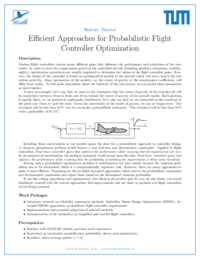Efficient Approaches for Probabilistic Flight Controller Optimization
- Institut
- Lehrstuhl für Flugsystemdynamik
- Typ
- Masterarbeit
- Inhalt
- theoretisch
- Beschreibung
Modern flight controllers contain many different gains that influence the performance and robustness of the controller.
In order to meet the requirements posed on the controlled aircraft (handling qualities, robustness, stability,
agility), optimization procedures are usually employed to determine the values of the flight controller gains. However,
the design of the controller is based on mathematical models of the aircraft which will never match the real
system perfectly. Many parameters of the models, e.g. the center of gravity or the aerodynamic coefficients, will
differ from reality. To still make statements about the behavior of the real system, we can model those parameters
as uncertainties.
To give an example: Let’s say that we came to the conclusion that the center of gravity of the real aircraft will
be somewhere between 10 cm in front and 10 cm behind the center of gravity of our aircraft model. Each position
is equally likely, i.e. its position is uniformally distributed. Let’s also say that we are interested in the overshoot of
the pitch rate when we pull the stick. Given the uncertainty of the center of gravity, we can no longer state ”The
overshoot will be less than 10 %” but we can make a probabilistic statement: ”The overshoot will be less than 10%
with a probability of 67.2 %”.Including those uncertainties in our models opens the door for a probabilistic approach to controller design.
A classical optimization problem would feature a cost function and deterministic constraints. Applied to flight
controllers: Find those controller gains that optimize the performance while ensuring that all requirements are met.
In the presence of uncertainties, the problem statement would sound more like this: Find those controller gains that
optimize the performance while ensuring that the probability of violating the requirements is below some threshold.
Solving such a probabilistic optimization problem is unfortunately not easy mainly because the violation probability
has to be determined which is a computationally expensive task. However, there are many approaches to
make it more efficient. Promising are the so-called decoupled approaches which convert the probabilistic constraints
into deterministic constraints and adjust those based on the determined violation probability.
If you like coding, algorithms and optimization, this thesis is the perfect pick for you. In this thesis, you would
familiarize yourself with the current approaches, find improvements and use those to optimize real flight controllers
of real flying systems!- Voraussetzungen
• Familiar with MATLAB (ideally, previous work experience)
• Experience in uncertainty quantification, probability theory and optimization
• Excellent, above-average grades (≤ 1.5)- Verwendete Technologien
- Matlab
- Möglicher Beginn
- sofort
- Kontakt
-
Cedric Kotitschke
Raum: MW3610
Tel.: +49 89 289 16490
cedric.kotitschketum.de - Ausschreibung
-
